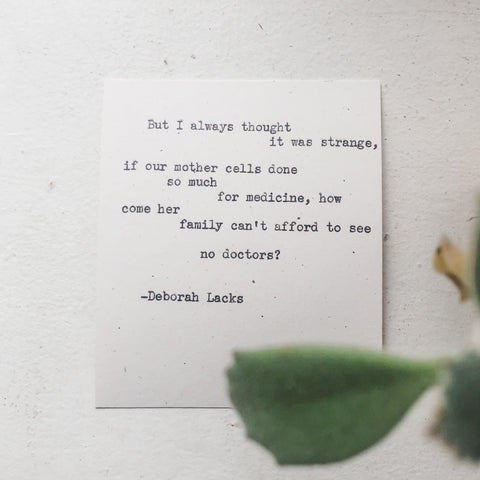
The Immortal Life of Henrietta Lacks by Rebecca Skloot
Share
In 1951, a Black mother of five named Henrietta Lacks died of cervical cancer, unaware that the cells from that cancer — a physical piece of her — would go on to live forever. Before her death, a researcher took samples of tissue from her cervix without her consent — a common but ethically murky procedure — and was surprised when they didn't die soon-after: the fate of most cells taken for research purposes. Henrietta's cells, instead, thrived and grew and didn't stop growing. They're still growing today: if you laid down all the cells, known as HeLa, from end to end, they would wrap around the Earth at least three times. We're talking about something so small that several thousand could fit on the head of a pin.
Before reading this book, I had never heard of Henrietta Lacks or HeLa cells. Author Rebecca Skloot, for her part, first learned of Henrietta when she sixteen years old while taking a biology class at a community college in 1988. HeLa cells have been one of the most important contributions to modern medicine; studies on them resulted in the polio vaccine, they were used in AIDS research, and they went up in the first space mission. Everyone in science seemed to know all about HeLa and why it was important. But Skloot couldn't find any information about the woman herself, who was often misnamed on websites as Helen Lane.
Skloot spent ten years researching Henrietta Lacks and HeLa while gaining the trust of the Lacks family to tell their story, which resulted in The Immortal Life of Henrietta Lacks, a 381-page biography that explains who Henrietta was, who her family is, how they have been impacted by the cells, and how the cells have shaped the world of medical research. Divided into three sections — Life, Death, and Immortality — the book meticulously examines everything that Henrietta's life and cells touched, from her birth in 1920 to the book's publication in 2009. Skloot spends countless hours with the Lacks family, especially with Henrietta's daughter, Deborah, who was a baby when her mother died and who was haunted by the existence of the cells and the way her family was mistreated throughout the process.
Despite the importance of HeLa to medical research, the Lacks family had no idea that a part of Henrietta was "immortal" until twenty years after her death, and they came upon the information by random chance. Nobody from Johns Hopkins — the hospital where Henrietta's cells were taken during an examination just months before her death — ever notified the Lacks family, including the researcher, George Gey, who originally grew her cells and released them to medical researchers across the globe. And though today a single vial of HeLa cells is sold for $575, the Lacks have never received any portion of the profits.
"I always thought it was strange," says Deborah to Skloot during one of their many long interviews, "if our mother cells done so much for medicine, how come her family can't afford to see no doctors?"
This book powerfully captures the Black community's long-standing distrust in medicine, the ever-present ethical dilemmas of research in regards to consent and compensation, the human cost of ground-breaking medical advances, and one family's navigation of the strange and detached fame of their loved one, who never agreed to being "immortal" or knew anything about it. I not only learned about science and cell research — which in fact helped me to better understand the process that must have occurred in creating a COVID-19 vaccine, in which HeLa was used as a research tool — but also about what a true reconciliation process might look like for a family who history almost forgot.
I highly recommend taking the time to read this book, which wrestles elegantly with big moral questions around science, race, history, and justice. You may be surprised, as I was, at how many of the issues regarding legality and consent are still unresolved today.

10 comments
http://slkjfdf.net/ – Owomouzex Uhuqewaca xee.flfa.floraandphrase.com.adj.ic http://slkjfdf.net/
http://slkjfdf.net/ – Uyetoas Urevit oon.nsvl.floraandphrase.com.zln.gp http://slkjfdf.net/
http://slkjfdf.net/ – Aacaqiuba Ijirudurw usd.vcyp.floraandphrase.com.dgc.to http://slkjfdf.net/
http://slkjfdf.net/ – Ogaweko Iwuquu bqn.bksg.floraandphrase.com.nqi.wo http://slkjfdf.net/
http://slkjfdf.net/ – Unofegab Vepupo erj.mxtj.floraandphrase.com.izo.ml http://slkjfdf.net/